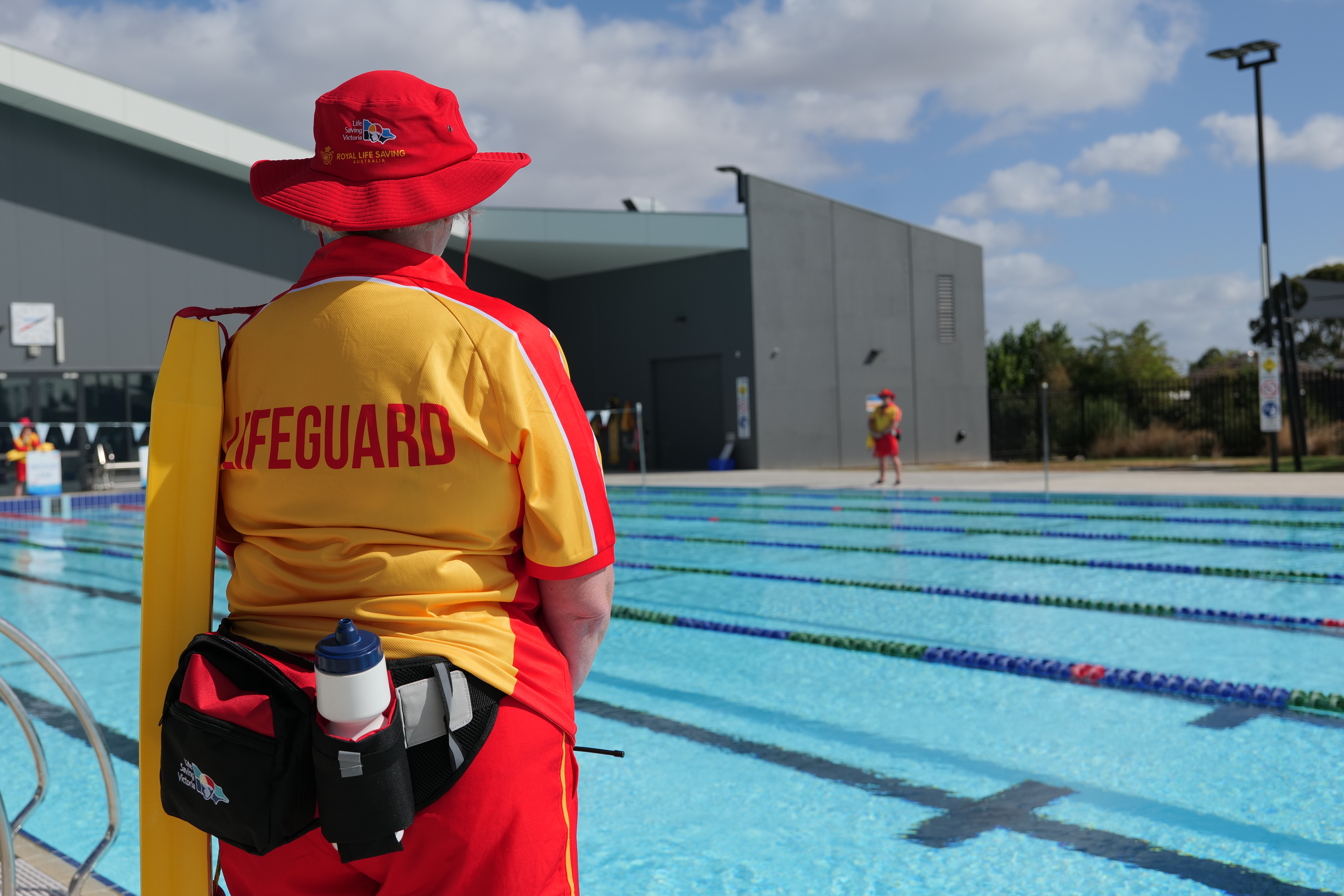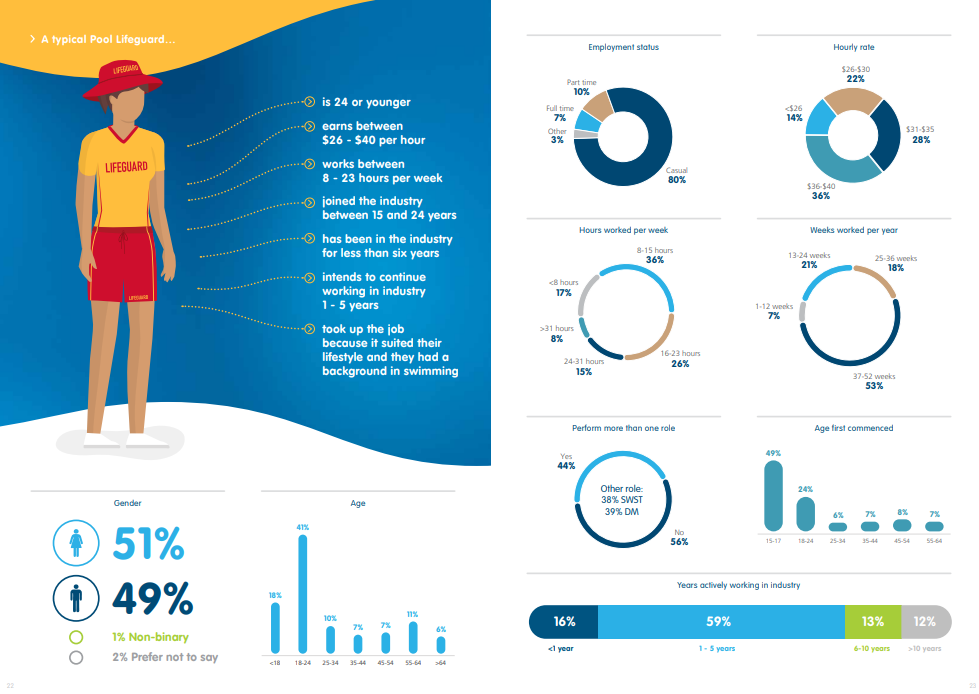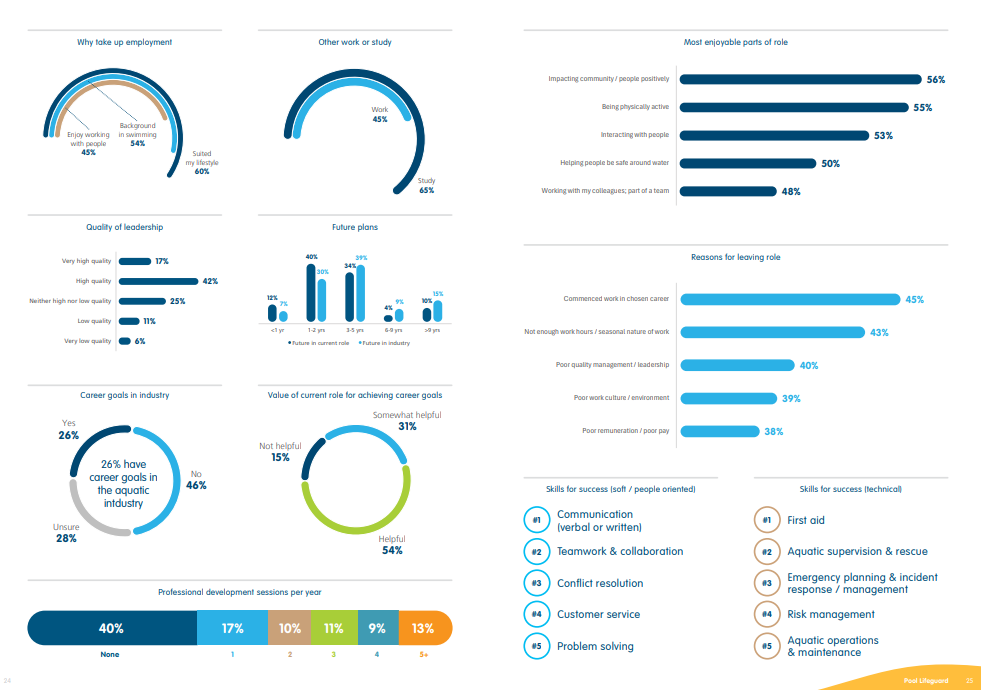Being a lifeguard comes with significant responsibilities. Pool lifeguards save lives and prevent serious injuries.
A career as a pool lifeguard brings challenges and rewards, and can lead to further job opportunities in the aquatic industry. It uses many core workplace skills such as communication, risk management, decision making, problem solving, teamwork, customer service and performing under pressure, all of which are transferable to other industry sectors. With the right qualifications, it is also a job that can take you all over Australia and the world.
You must be a strong swimmer, and, naturally, the job requires a certain degree of fitness, strength and stamina to act quickly in the case of an emergency.
You must have recognised first aid and resuscitation qualifications, and these must be regularly reviewed and updated.
Flexible working hours
Most lifeguards work part time and casually, and enjoy the flexibility this brings. For example, it allows some people to study while working, or have a second job. For others, it fits in well with childcare or family obligations, allowing you to work when it suits you.
However, lifeguarding can provide a stepping stone for other full-time roles in the aquatic industry and it is also possible to combine roles within a particular facility; for example, you might combine lifeguarding with swim teaching.
Career pathways
After gaining experience working as a lifeguard, you might become a lifeguard team coordinator, and then a duty manager, and eventually an aquatic facility manager. With additional training, it is also possible take on more technical roles such as an aquatic technical operator; managing the water quality, chemicals and plant room equipment.
What does it involve day-to-day?
Each pool lifeguard shift can vary, depending on the day of the week, time of day and time of the year. The challenge is to remain vigilant at all times, regardless of whether it is super busy or quiet at any given time.
Risk management
Every working day requires a lifeguard to think in terms of risk management. Can I identify any hazards and what are the risks associated with those hazards? Is that a broken tile on the steps? How far away is that lightning and thunder? Are those children playing ‘hold your breath’ and, if so, how safe is it?
Communication
Your day will involve anything from saying hello and having a quick chat with the regulars, to instructing kids on how to safely use inflatable pool equipment, to explaining rules and procedures to parents and to exchanging information with fellow lifeguards about an area you were just supervising or even to coordinate your response in a rescue situation.
Strong communication skills are a must, which includes the ability to actively listen, analyse and make sense of what is going on around you.
Supervision
Effective supervision is critical. This means maintaining concentration and focus throughout your shift, constantly scanning for and recognising people in difficulty.
You will generally be assigned to a particular pool - or zone of a pool - but will be asked to rotate with other colleagues regularly. You may move to a different position or post in the same zone (eg, the deep end of the main pool) or to a completely different area (eg, from the main pool to the waterslide exit).
Decision making
Each day you will be making all sorts of decisions about when and how to act. Decision making and problem solving, independently and with others, are skills you will regularly call on and will need to develop and hone. This includes, for example, deciding how best to ensure your zone is covered while you attend to an elderly person that is feeling unwell or dealing with a group of children that continue to chase each other around the pool deck despite your instructions not to.
First aid
While you may not be required to carry out a major rescue or emergency everyday, your work will involve dealing with minor injuries and incidents, everything from kids with bruises and scrapes to a capable swimmer needing help out of the pool due to cramp.
Reporting
At the start and end of each shift, you will need to sign on and off, and complete any reporting duties. For example, you may need to submit an incident report in line with the aquatic facility’s operating procedures.
Facilities management
Part of your role will involve setting up or packing up the facility and equipment. This includes checking emergency equipment and supplies, assisting with pool water treatment, checking the environment for hazards and completing appropriate log books and reports.
Conflict management
Lifeguards need to enforce the rules in order to prevent incidents from occurring and keep everyone safe. This can lead to some difficult conversations and even conflict. You may, for example, have to ask parents to better supervise their children or remind a bather they cannot take a drink into the pool. This requires good communication and conflict management skills to resolve such situations as positively as possible, which can be stressful and frustrating, something all lifeguards need to make sure they are physically, mentally and emotionally prepared for.
What lifeguards say about the role
In an aquatic industry survey, lifeguards told us that the most rewarding and enjoyable elements of the role are working as part of a team and helping people, whether that be colleagues or patrons. Check out and download the full pool lifeguard profile below.
If this sounds like you, and you are up for the challenge, find out more about Royal Life Saving's Pool Lifeguard courses.



